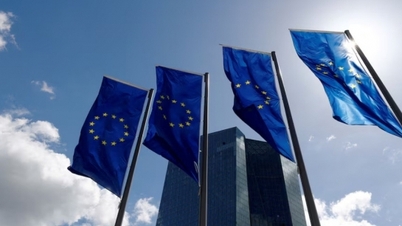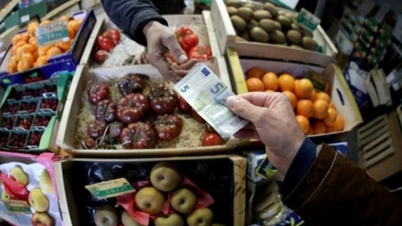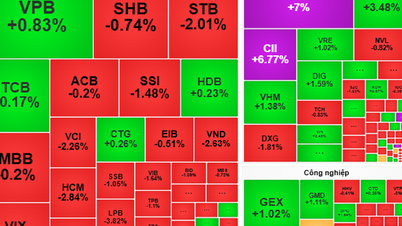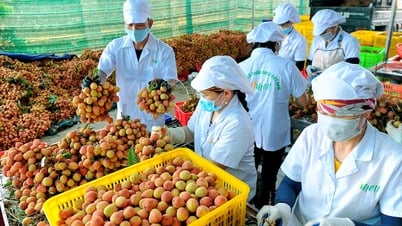 |
| The Eurozone economy continues to stagnate. A Spanish food market is pictured. (Source: Bloomberg) |
The findings could reinforce the ECB's view that inflation is now on track to continue falling slightly towards its 2% target, while also supporting its argument for keeping interest rates steady after an unprecedented 10-fold hike that has pushed rates to a record high of 4%.
In a post by the ECB, the bank said that the top 20% of households held 49.3% of excess savings in 2020-2022.
The next 20% group held about 19.8% of savings in the reporting period.
Since rich people are less likely to spend the extra money they save, this means those savings are unlikely to be used in the near future.
Some of those savings have been invested in assets like stocks and bonds, or in real estate, making them harder to access, the article notes.
The ECB kept interest rates unchanged at its meeting last week.
Investors now expect the central bank to start cutting rates in the spring of 2024, as inflation falls and the economy stagnates or even shrinks.
The Eurozone economy is at risk of falling into recession later this year, after statistics released on October 31 showed that the region's gross domestic product (GDP) contracted slightly in the third quarter of 2023.
According to a preliminary report from Eurostat - the statistical agency of the European Union (EU) - the GDP of the 20 countries in the Eurozone decreased by 0.1% in the third quarter of 2023 compared to the previous quarter, after increasing by only 0.2% in the second quarter of 2023. This shows that the boundary between growth and decline of the European economy is extremely fragile.
Previously, the region was almost flat in Q4/2022 and Q1/2023.
“The big picture is that the eurozone economy is struggling,” said Jack Allen-Reynolds, deputy chief eurozone economist at research firm Capital Economics. “The economy grew by just 0.1% over the past year and business surveys consistently point to a contraction in activity at the start of the fourth quarter of 2023.”
The eurozone economy will continue to stagnate whether or not it enters a technical recession - defined as two consecutive quarters of GDP decline - he added.
Source



![[Photo] Panorama of the Opening Ceremony of the 43rd Nhan Dan Newspaper National Table Tennis Championship](https://vphoto.vietnam.vn/thumb/1200x675/vietnam/resource/IMAGE/2025/5/19/5e22950340b941309280448198bcf1d9)
![[Photo] Close-up of Tang Long Bridge, Thu Duc City after repairing rutting](https://vphoto.vietnam.vn/thumb/1200x675/vietnam/resource/IMAGE/2025/5/19/086736d9d11f43198f5bd8d78df9bd41)

![[Photo] President Luong Cuong presents the 40-year Party membership badge to Chief of the Office of the President Le Khanh Hai](https://vphoto.vietnam.vn/thumb/1200x675/vietnam/resource/IMAGE/2025/5/19/a22bc55dd7bf4a2ab7e3958d32282c15)
![[Photo] General Secretary To Lam attends the conference to review 10 years of implementing Directive No. 05 of the Politburo and evaluate the results of implementing Regulation No. 09 of the Central Public Security Party Committee.](https://vphoto.vietnam.vn/thumb/1200x675/vietnam/resource/IMAGE/2025/5/19/2f44458c655a4403acd7929dbbfa5039)




























![[Photo] Prime Minister Pham Minh Chinh inspects the progress of the National Exhibition and Fair Center project](https://vphoto.vietnam.vn/thumb/1200x675/vietnam/resource/IMAGE/2025/5/19/35189ac8807140d897ad2b7d2583fbae)




























































![[VIDEO] - Enhancing the value of Quang Nam OCOP products through trade connections](https://vphoto.vietnam.vn/thumb/402x226/vietnam/resource/IMAGE/2025/5/17/5be5b5fff1f14914986fad159097a677)





Comment (0)